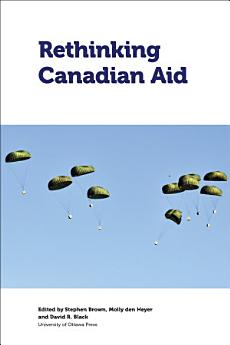Rethinking Canadian Aid
About this ebook
Edited by Stephen Brown, Molly den Heyer and David R. Black, this is the first book on Canadian foreign aid since CIDA was folded into DFATD. Designed to reach a variety of audiences, contributions by twenty-one scholars and experts in the field offer an incisive examination of Canada’s record and recent changes in Canadian foreign aid, such as its focus on maternal and child health and on the extractive sector. Many chapters also ask more fundamental questions concerning the intersection of the moral imperative that underpins aid and the trend towards greater self-interest. For instance, what are and what should be the underlying motives of Canadian aid? How compatible are altruism and self-interest in foreign aid? To what extent should aid be integrated with Canada’s other policies and practices?
The portrait that emerges is a sobering one. This book is essential reading for anyone interested in Canada’s changing role in the world and how it reflects on Canada.
Ratings and reviews
- Flag inappropriate






